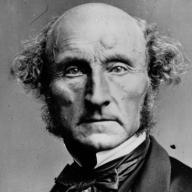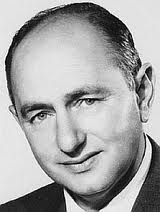Where have all the Leaders gone?
 John Stuart Mill
John Stuart Millonce wrote that not all conservatives are stupid, but most people who
are stupid are conservative. That is probably because they are afraid of
what they don’t know. People seek guidance at every turn and accept the
time honoured practices and formulae of the past; they view such a
strategy as safe. In short, they don’t know any better and don’t want
to. They just want to be reassured. Conservative politicians are good at
offering that. It’s politically clever but it’s not leadership.
Prior to the time when Gough Whitlam came to power I was apolitical.
Back around the late 1950s my parents were DLP voters which was hardly
surprising coming as they did from an Irish-Catholic background. They
thought they were supporting a Catholic breakaway party resisting what
was perceived as an unhealthy communist influence within the Labor
party.
This was the era of Bob Santamaria, the National Civic Council and
Archbishop Daniel Mannix. Santamaria was depressing fellow who saw
danger at every corner. If he wasn’t paranoid about communists, it was
trade unions, sexual deviants or left wing university students. He even
advocated the abolition of the ABC. But it was a different time and
mindset from what we value today and in the end not a lot of what he
espoused or campaigned for, ever came to pass. What Tony Abbott saw in
him is unclear other than that of an anti-communist Catholic zealot but,
I suspect Abbott still clings to the image of what he thought the man
was. Daniel Mannix was of similar mind to Santamaria but he went
further. He misused his position as Archbishop of Melbourne and told
Catholics that if they voted for Labor they would be committing a mortal
sin.
 So,
So,in my first voting foray in 1963 I followed my parents lead and voted
DLP. That continued until 1972 when Labor gained power after 23 years in
opposition. Mannix was dead and the communist influence in the party
had been marginalized and the Coalition looked tired and lacking of a
vision for the future. I thought Whitlam was a breath of fresh air. He
ended conscription (of which I had been a part) and brought home the
remaining troops from Vietnam and began reforming the education system;
he socialized health and encouraged reform on some of the more sensitive
moral issues of the day.
Labor, under Whitlam, had a vision and it seemed that we were heading
down a more enlightened path. But, they seemed not to understand
economics very well and inflation and interest rates were taking their
toll. The coalition smelt blood and rejected several bills in the
senate. This was new to the baby boomers and to those of us who were
part of the silent generation. The government seemed not to be able to
govern. Whitlam decided to go back to the people in 1974 and ask for a
fair go. The people said okay, but fewer voted for them compared with
1972.
 From
Fromthat point on, the coalition was relentless in its efforts to stop the
government from functioning. Inflation and interest rates continued to
soar and, in what I viewed as disrespect for the democratic process, the
coalition decided to block supply. This demonstrated to me that the
Liberal party was more interested in governing than they were in
democracy. Their actions precipitated the Governor-General dismissing
the government, installing a care-taker prime minister, Malcolm Fraser,
and we had another election in1975. Whitlam and Labor lost in a
landslide. It was humiliating. Nothing that happened subsequently
convinced me that the actions of the conservatives were justified.
Indeed, it was their own economic mismanagement under the then
treasurer, John Howard that saw them thrown out seven years later.
Then came the Hawke/Keating years when the economic parameters we
used for decades underwent major reforms to give us what we have today.
Having seen and experienced the benefits of Labor’s reforms over the
past thirty years, I have come to view the Liberal party with great
suspicion. They appear to lack a moral compass, preferring to ride
whatever train would take them to government and keep them there. They
appear not to have a vision for the future, preferring to govern for
today and not worry about tomorrow. They appear uninterested in shifting
from the accepted norms of the day or ever question some of the time
honoured traditions of western society. Is it any wonder then that their
principal support comes from the more conservative echelons of a white
middle-class Anglo-Saxon mindset.
 With
Withsuch a limited vision what chance does Australia have of ever moving
forward under their watch? The manner in which they approach issues such
as health, education, cutting edge technology, climate control, asylum
for refugees, drug law reform as well as working class and minority
rights are all testament to a party that is more concerned with staying
in government than in reforming outdated social attitudes. Their
obsession for frugal, fiscal management masks their financial flaws and
underlines their belief that if the people are happy with the state of
their hip pocket, that is all they need to worry about to stay in power.
It is a sound political philosophy but it is not leadership.
That brings us to the present day. We put this government in power
and they are, therefore, a reflection of us. So much of what politicians
tell us comes from information that focus groups tell them. Over the
years I have witnessed some interesting performances by a variety of
politicians on both sides. Some have leadership qualities superior to
others and I have often thought that the wrong person was leading the
country. Leaders today get elected on the basis of three-word slogans;
they become the people’s choice for the time being. They use catchy
little phrases to attract uninformed voters. They borrow most of them
from past, equally unimpressive leaders and have nothing original to
contribute. With Tony Abbott, this is one such time.
But today, they all seem to stand or fall down under the weight of a
national media that is more relentless than anything we experienced back
in the days of the DLP. As long as the media continue to call the shots
on image and visual performance of our politicians, we will always get
what we deserve, and those with real leadership quality will be left on
the sidelines.
No comments:
Post a Comment